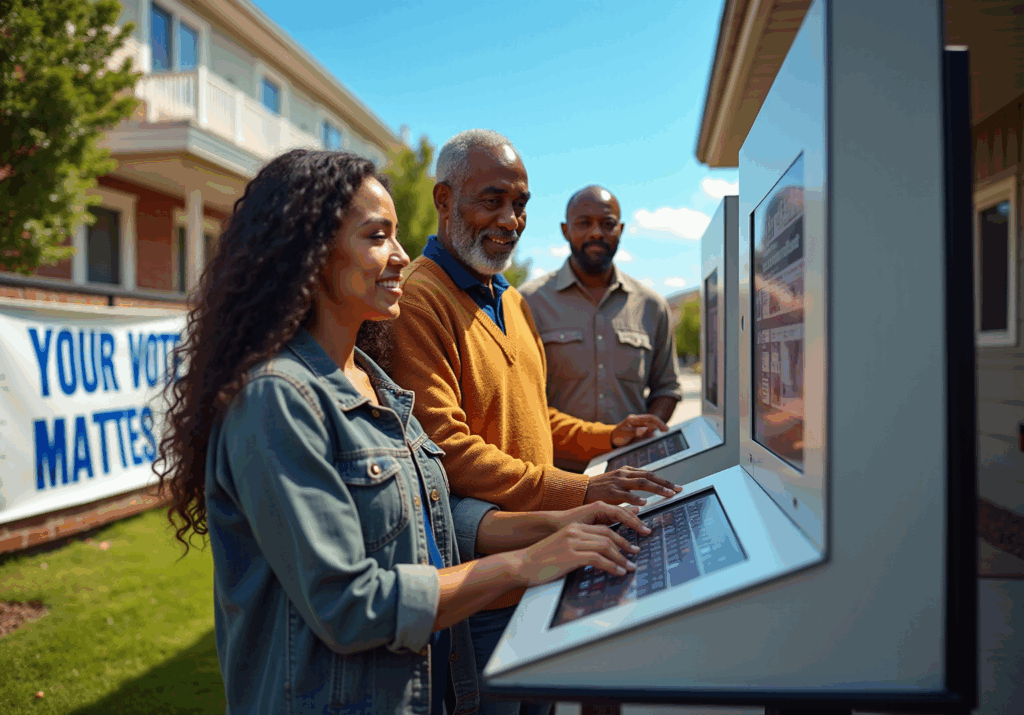Overview
The article titled “10 Reasons People Vote for Candidates in Representative Democracy” delves into the myriad factors that shape voter behavior within a democratic framework. It asserts that individuals cast their votes for candidates who:
- Resonate with their social issues
- Exhibit trustworthiness in the electoral process
- Demonstrate accountability as elected officials
- Leverage technology to improve accessibility
Collectively, these elements foster informed and engaged voting practices. Furthermore, understanding these motivations is crucial for enhancing democratic participation and ensuring that the electoral system reflects the will of the people.
Introduction
In the intricate landscape of representative democracy, voting transcends mere participation; it embodies the voice of the people and their aspirations for governance. As citizens navigate the complexities of their electoral choices, understanding the myriad factors that influence their decisions becomes essential. This exploration delves into ten compelling reasons why individuals cast their votes for specific candidates, shedding light on the psychological, social, and technological dynamics at play. What drives a voter to support one candidate over another? How do these motivations shape the future of democratic representation? These questions are pivotal as we seek to understand the nuances of electoral behavior.
Votem: Secure Online Voting Solutions for Representative Democracy
The CastIron platform offers a secure and compliant online voting solution tailored for organizations such as credit unions, labor unions, and pension funds. By facilitating clear and secure polls, Votem significantly enhances public trust and involvement—two vital components of a thriving representative democracy where people vote for candidates to represent them in the decision-making process in a democratic system. This platform adheres to stringent regulatory standards, ensuring reliability for organizations dedicated to upholding democratic principles in their electoral processes.
Recent data indicates that 92% of participants in 2024 deem it essential to receive results promptly, highlighting a growing demand for swift and dependable electoral outcomes. Furthermore, successful implementations of online ballot solutions have demonstrated increased participation, particularly within labor unions, where streamlined processes have led to higher turnout rates. Experts emphasize that secure online ballot platforms are crucial for maintaining public trust in democratic processes, as they ensure that people vote for candidates to represent them in the decision-making process in a secure and reliable manner, mitigating risks associated with traditional methods.
The organization’s commitment to security and transparency, coupled with features like user-friendly interfaces and robust encryption, positions it as a leader in advancing democratic electoral practices. This fosters an environment where voter confidence can flourish. Union leadership must recognize the importance of these , as they not only enhance participation but also ensure that people vote for candidates to represent them in the decision-making process in a democratic system.
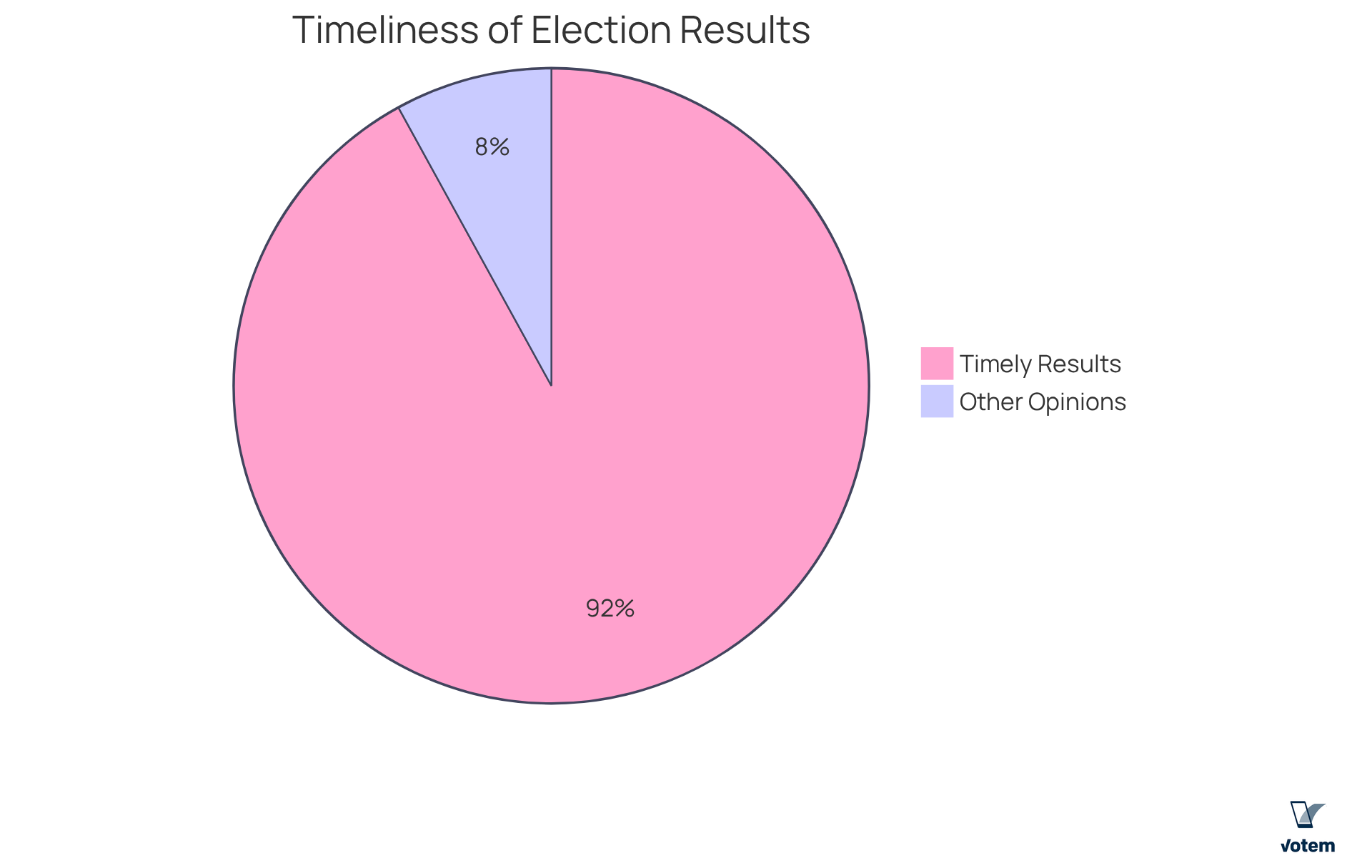
Voter Representation: Ensuring Diverse Interests Are Addressed
In a representative democracy, it is paramount to ensure that all voices are heard. Voter representation is essential because it ensures that people vote for candidates to represent them in the decision-making process in a way that incorporates diverse interests, particularly those of . This inclusivity fosters a more equitable society and ensures that policies reflect the needs of the entire population rather than just a privileged few. Recent studies suggest that when varied groups engage in voting, the resulting policies are more likely to address a broader range of societal issues, leading to enhanced outcomes for all citizens.
Organizations such as Votem play a crucial role in enabling elections that encourage diverse representation through accessible methods for casting ballots. By leveraging secure online voting platforms, Votem facilitates participation from various demographics, including those who may face barriers in traditional voting settings. This approach not only increases voter turnout but also enhances the legitimacy of electoral outcomes by ensuring that all segments of society can engage in the democratic process where people vote for candidates to represent them in the decision-making process in a more inclusive manner. Ultimately, the impact of diverse representation extends beyond mere participation; it shapes policy outcomes that are more reflective of the community’s collective needs and aspirations.
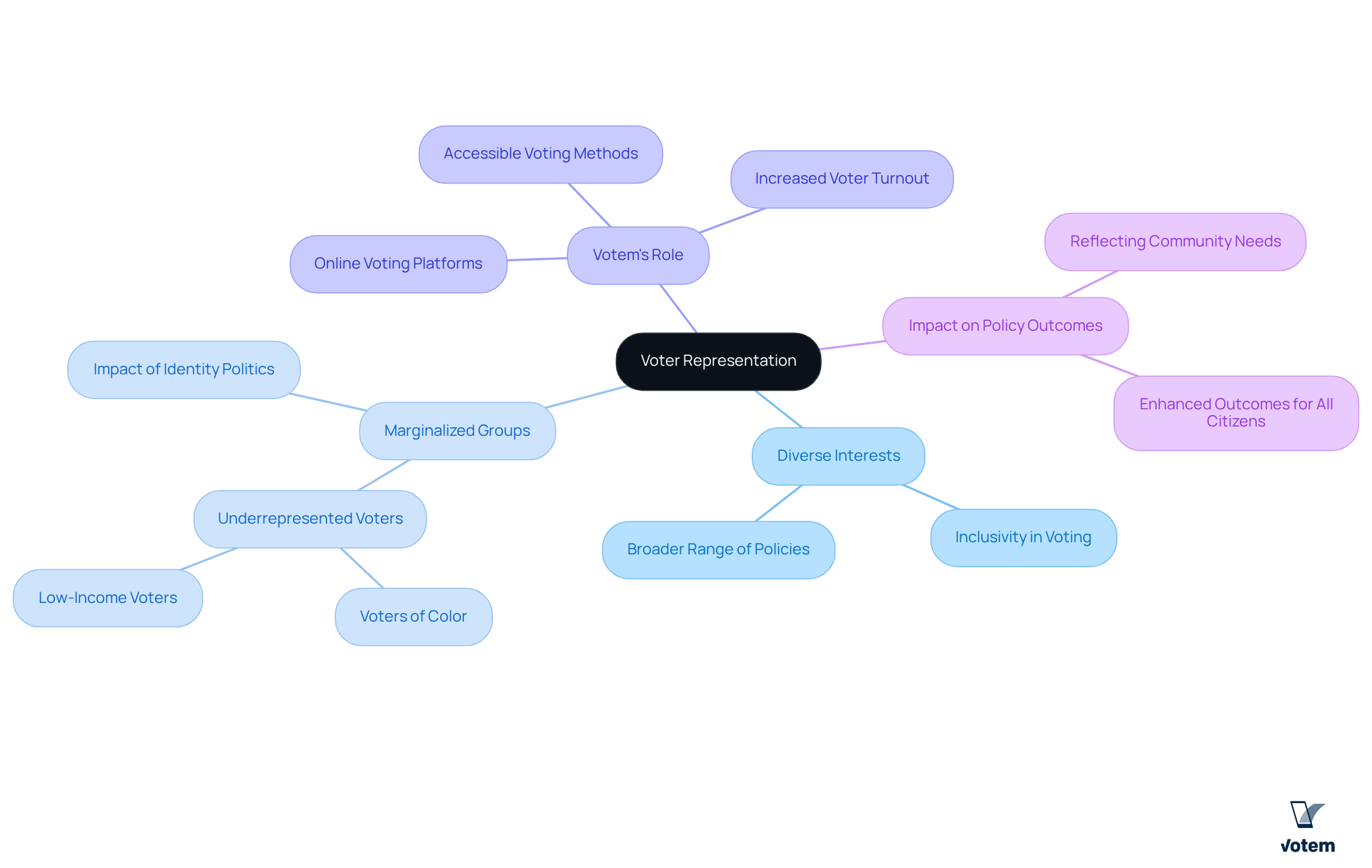
Accountability: Holding Elected Officials Responsible for Their Actions
In a representative democracy, accountability is essential because people vote for candidates to represent them in the decision-making process and to ensure that elected officials fulfill their obligations to the electorate. Regular elections, transparency in governance, and public oversight are critical mechanisms that ensure people vote for candidates to represent them in the decision-making process in a responsible manner. Furthermore, secure online ballot solutions from Votem play a crucial role in this process. By enabling constituents to express their preferences and evaluate their representatives’ performance, these solutions enhance the democratic process where people vote for candidates to represent them in the decision-making process in a.
In addition to facilitating accessible and transparent balloting, Votem significantly boosts public trust and involvement. This ultimately promotes a more accountable political environment. The platform’s unwavering commitment to security and compliance guarantees that every vote is counted accurately. This reinforces the integrity of the electoral process, where people vote for candidates to represent them in the decision-making process in a way that empowers voters to hold their elected officials responsible for their actions.
As we consider the implications of these innovations, it is clear that embracing secure online voting systems is vital for fostering accountability in our democratic institutions. Union leadership must recognize the importance of these tools in and public trust.
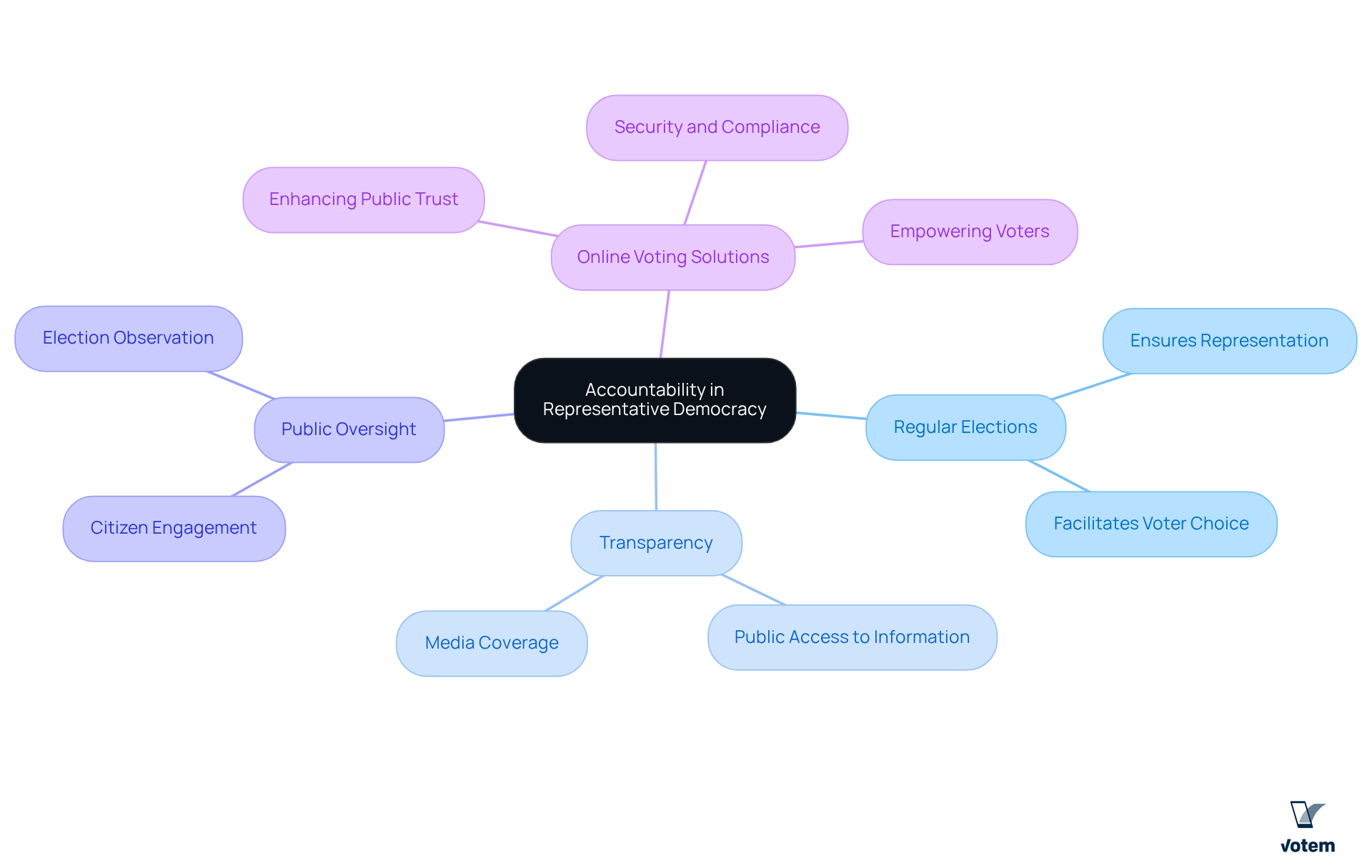
Civic Engagement: Encouraging Active Participation in the Democratic Process
Civic engagement stands as the lifeblood of a healthy democracy. It encompasses a range of activities, including community organizing, public discourse, and instances where people vote for candidates to represent them in the decision-making process in a democracy. By encouraging citizens to actively engage in the democratic process where people vote for candidates to represent them in the decision-making process in a democracy, we not only strengthen the electoral system but also cultivate a sense of ownership and responsibility among the electorate.
The platform enhances civic involvement by streamlining the voting process, making it easier for people to vote for candidates to represent them in the decision-making process in a more effective way, thereby increasing participation rates. Furthermore, as Linda McCulloch, a former official, noted, “Implementing the new, modern system that allowed greater access for all qualified voters from military voters to voters with disabilities was my greatest accomplishment in office.”
This is echoed by Kraig Kitchin, who stated, “The organization successfully managed the receipt of 299,000 votes on behalf of the National Radio Hall of Fame, an increase over last year’s 126,000 votes received.”
These testimonials underscore Votem’s significant role in promoting a more inclusive and secure election process. Thank you for your efforts in every way!
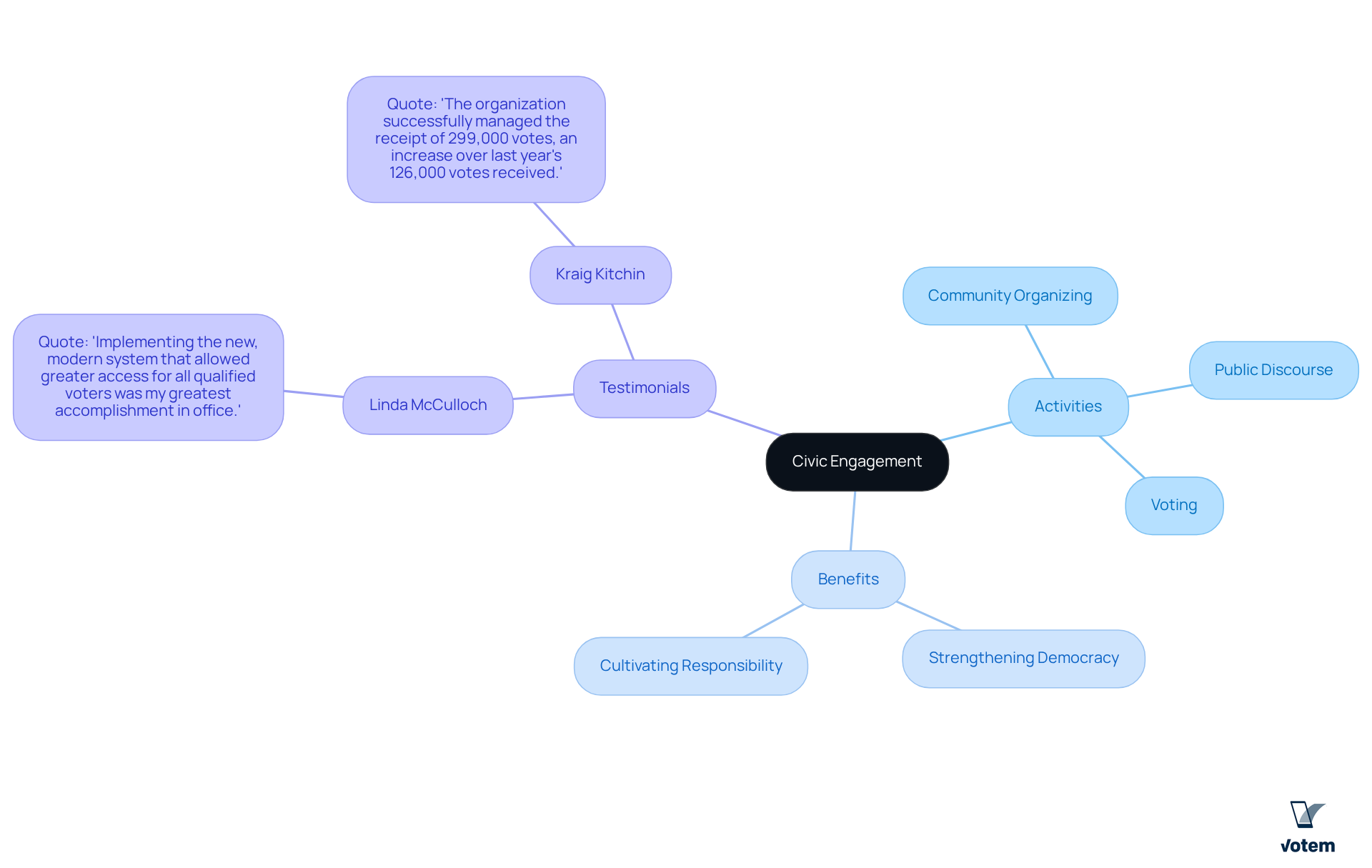
Informed Voting: The Importance of Knowledge in Decision-Making
Informed participation is essential for ensuring that people vote for candidates to represent them in the decision-making process in a way that genuinely reflects their will. When voters are equipped with knowledge about candidates, policies, and the electoral process, people vote for candidates to represent them in the decision-making process in a way that resonates with their values. Research indicates that knowledgeable electors, who understand that people vote for candidates to represent them in the decision-making process in a democracy, are not only more involved but also have a greater chance of participating in elections, which can lead to higher turnout.
Organizations such as Votem play a crucial role in facilitating informed participation by providing extensive resources and information that empower individuals to comprehend their options. This commitment enhances the quality of the democratic process while fostering a more . Furthermore, initiatives from diverse organizations, including non-partisan electoral guides and educational resources, contribute significantly to this goal, ensuring individuals have access to precise information.
As we approach the 2024 general election, the importance of these resources becomes increasingly pronounced; they help combat misinformation and promote a well-informed voting populace.
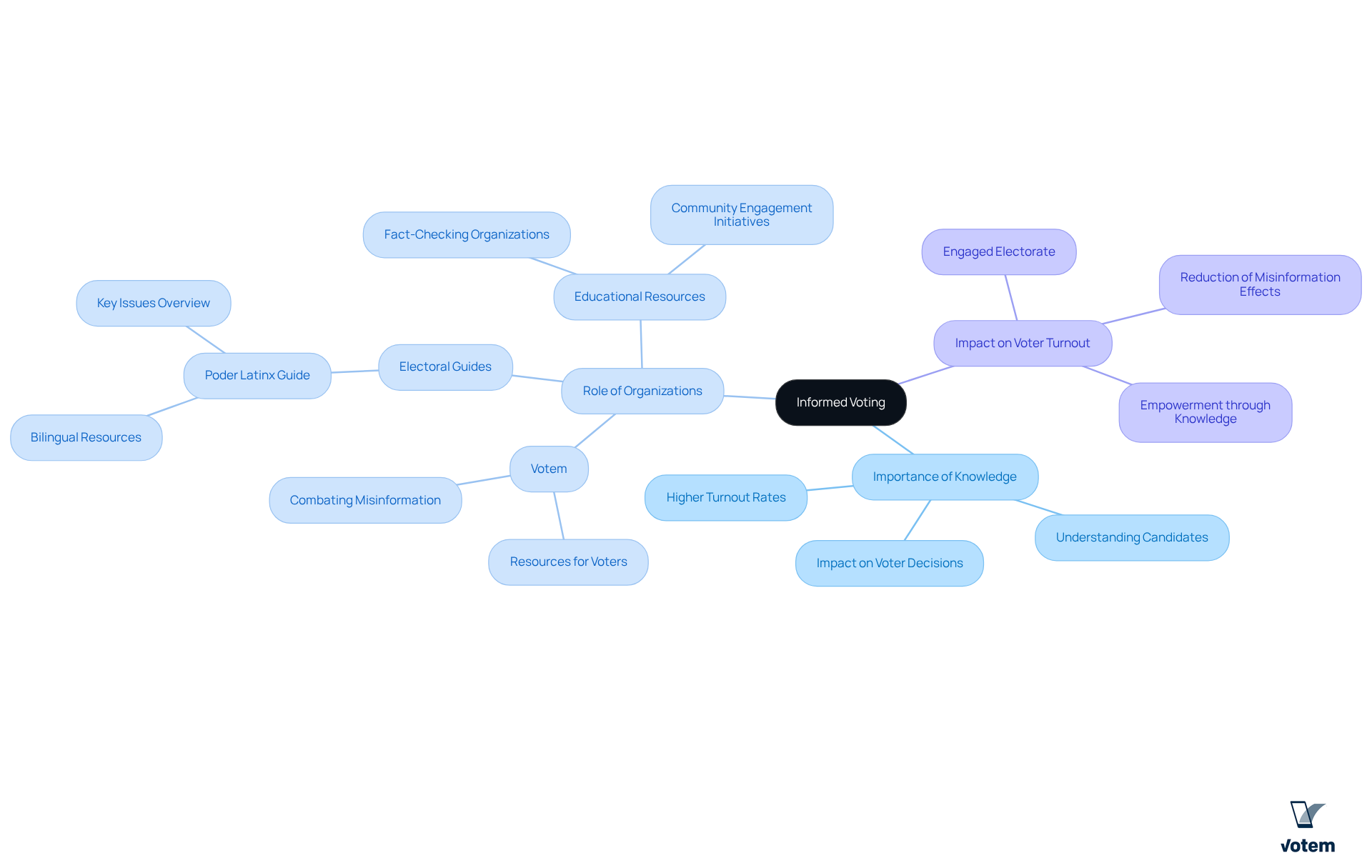
Political Parties: Influencing Voter Choices and Ideologies
Political groups play a pivotal role in shaping electoral preferences and ideologies, serving as the bedrock of political dialogue. By articulating clear platforms and values, they significantly influence public perceptions of issues and candidates. Studies indicate that citizens’ alignment with party platforms can lead to substantial shifts in electoral outcomes, as demonstrated in the 2020 election, which saw record participation despite widespread skepticism towards the party system. This underscores the essential function parties serve in and educating the electorate on policy matters. However, it is crucial to recognize that only 11% of Americans express high confidence in political parties, highlighting a pervasive distrust that presents challenges for these institutions in effectively engaging the electorate.
Moreover, the relationship between political parties and voter behavior is intricate. As Election Day approaches, individuals’ loyalty to their party affiliations typically intensifies, rendering them less receptive to changing their preferences. This phenomenon underscores the importance of understanding party platforms and their influence on electoral ideologies. Research shows that individuals exposed to targeted political messaging are more inclined to support candidates who resonate with their values, illustrating how effective communication can influence public opinion. This complexity is further emphasized by findings suggesting that the electorate can be swayed by new information, indicating that party platforms must evolve to remain relevant.
Furthermore, political parties foster civic engagement by providing clear policy perspectives that encourage people to vote for candidates to represent them in the decision-making process in an informed manner. They serve as a bridge among diverse interests within the electorate, facilitating coalitions that bolster democratic participation. The necessity of robust political parties is evident; they not only stabilize democracy but also ensure that the electorate stays informed and engaged, ultimately reinforcing support for democratic norms. As highlighted, democracy is ‘unthinkable’ without political parties, reaffirming their indispensable role in the democratic process.
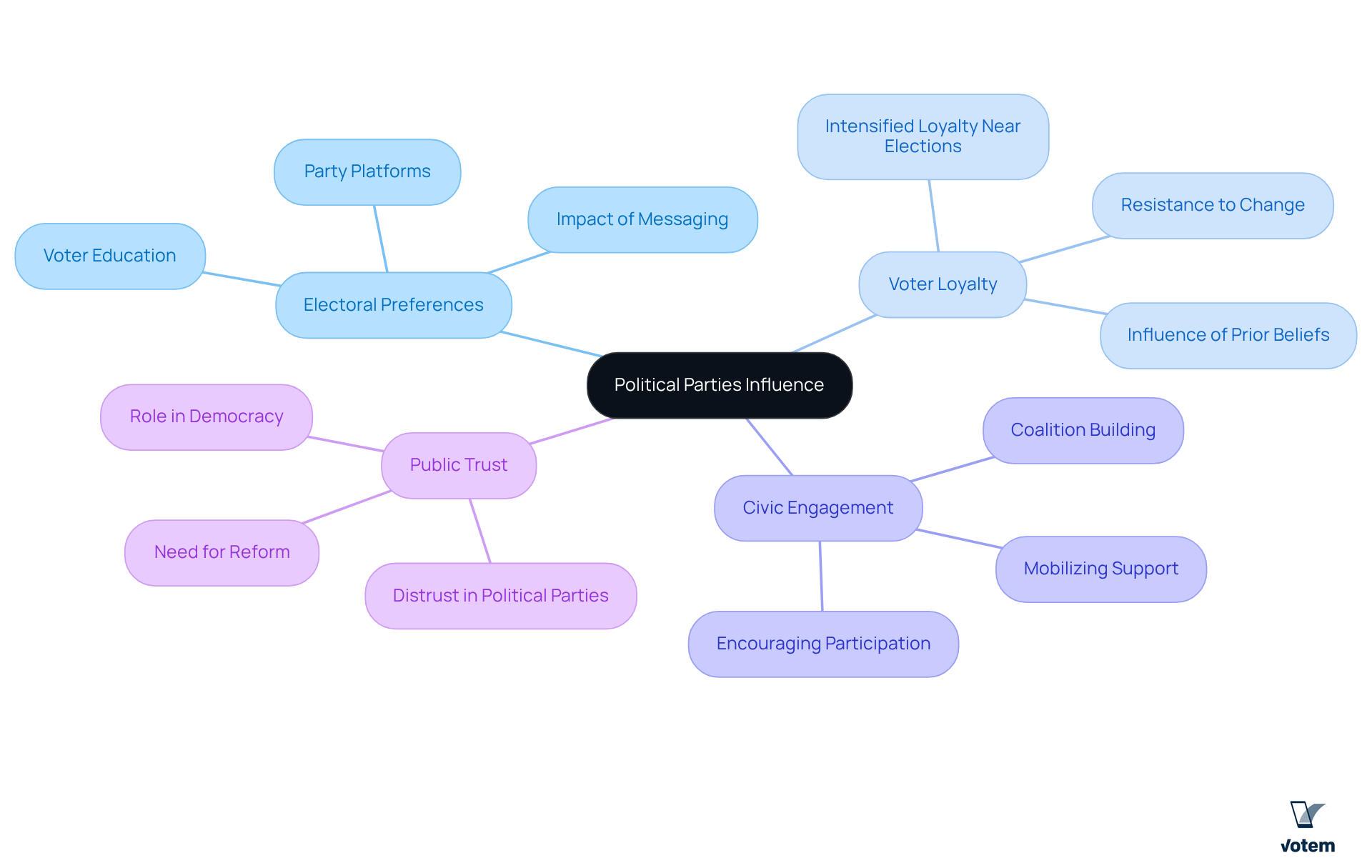
Social Issues: Shaping Voter Preferences and Turnout
Social issues play a pivotal role in influencing electoral preferences and turnout, as people vote for candidates to represent them in the decision-making process in a context that includes key topics like healthcare, education, and social justice, which resonate deeply with constituents. Recent polling indicates that 65% of Americans believe healthcare access and costs will significantly impact their voting choices in the upcoming contests. Candidates who prioritize these issues can cultivate stronger relationships with constituents, as people vote for candidates to represent them in the decision-making process in a manner that ultimately drives higher engagement and turnout.
In the 2024 elections, people vote for candidates to represent them in the decision-making process in a healthcare context, with 25% of participants recognizing it as the most significant factor affecting their decisions. This trend reflects a broader pattern where , including education and economic stability, increasingly influence how people vote for candidates to represent them in the decision-making process in a democratic system. For instance, Vice President Harris received substantial support from individuals prioritizing abortion policy, highlighting how addressing specific social issues can engage crucial demographics.
Furthermore, candidates can leverage platforms to promote discussions about these urgent matters, so that people vote for candidates to represent them in the decision-making process in a way that enables them to make informed decisions reflecting their values. By engaging constituents on healthcare and education, candidates not only enhance their appeal but also contribute to a more informed electorate, thereby ensuring that people vote for candidates to represent them in the decision-making process in a democratic system.
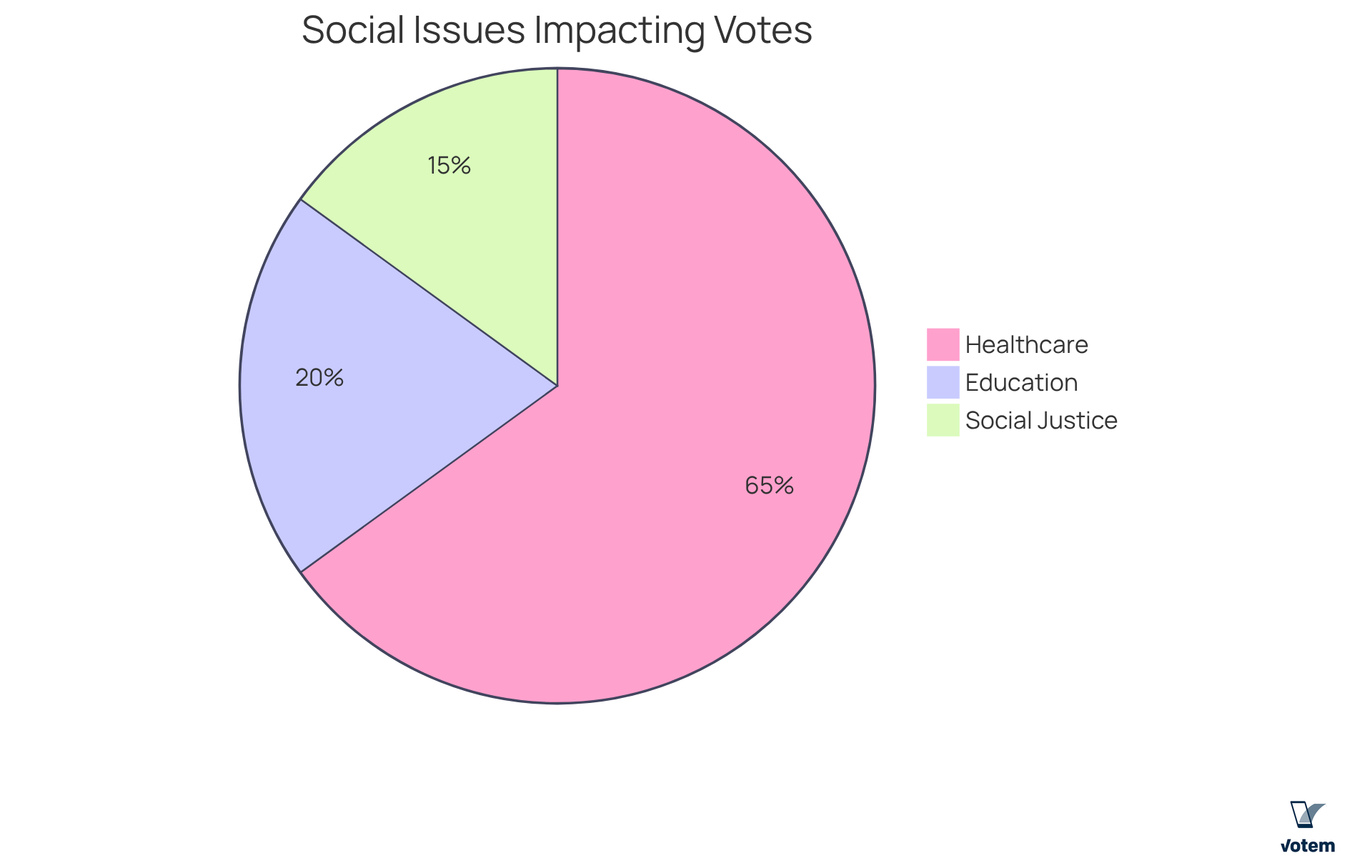
Trust in the Electoral Process: Building Confidence Among Voters
Trust in the electoral process is essential for a thriving democracy. When citizens perceive contests as just and open, their chances of rise considerably. This platform enhances that trust through its secure and compliant online system, adhering to stringent regulations such as NCUA, DOL, ERISA, and SOC 2 requirements. By guaranteeing that ballots are executed with integrity, the organization not only provides a reliable voting solution but also cultivates trust among voters. This is particularly crucial in a landscape where nearly half of Americans express doubts about election fairness. The organization’s commitment to transparency and security is instrumental in maintaining democratic legitimacy.
Furthermore, as Linda McCulloch remarked, “Implementing the new, modern system which provided greater access for all eligible participants, from military individuals to those with disabilities, was my greatest achievement in office.” This statement underscores the importance of inclusivity in the electoral process. Additionally, the organization successfully managed the receipt of 299,000 votes for the National Radio Hall of Fame, demonstrating a notable increase in public participation. By enabling citizens to participate confidently in the voting process, the organization ensures that people vote for candidates to represent them in the decision-making process in a fair manner.
In addition, this highlights the significance of public awareness regarding voting procedures and security. It is imperative for union leadership to recognize these elements, as they play a vital role in fostering a culture of trust and engagement among constituents. The proactive measures taken by the organization not only enhance voter confidence but also reinforce the democratic process itself.
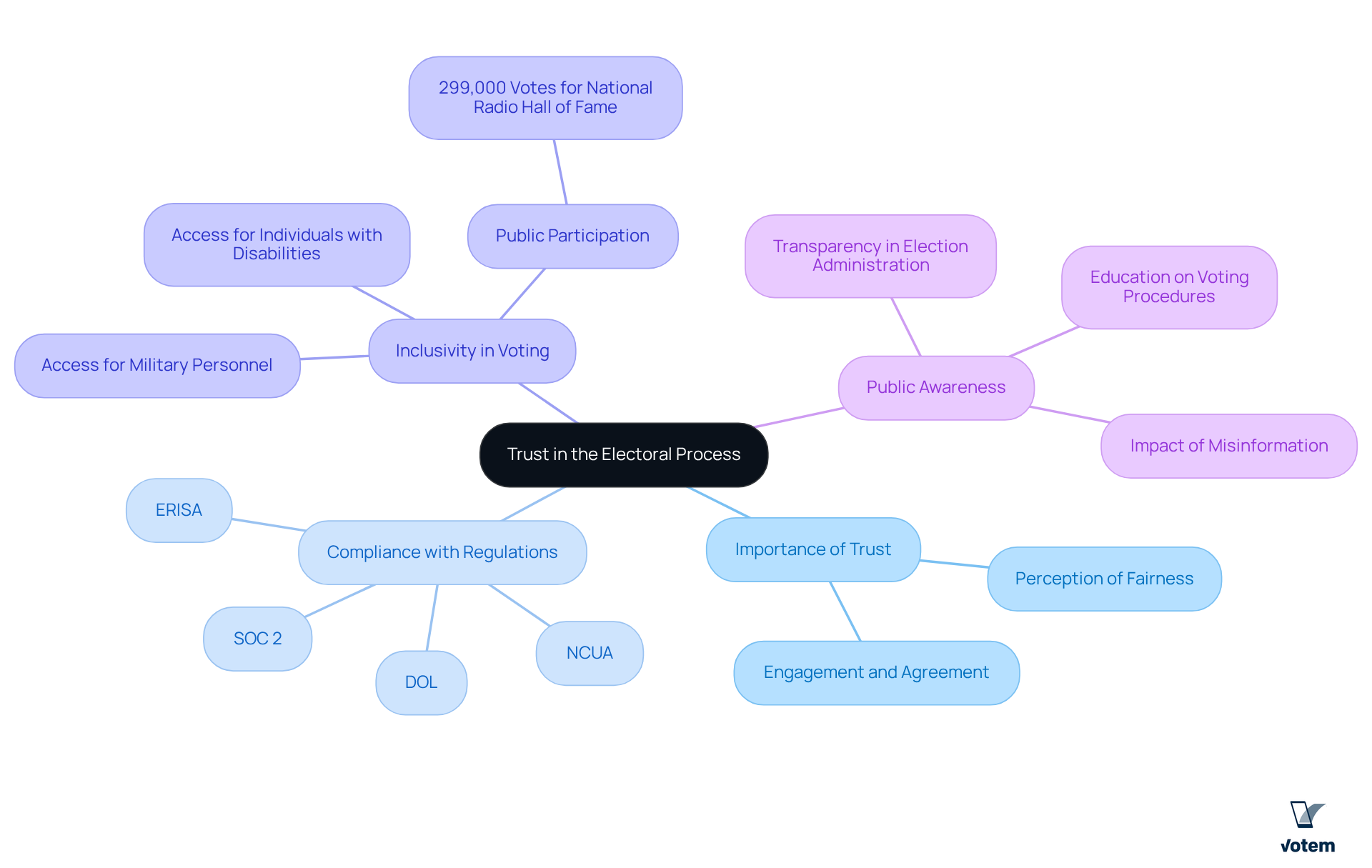
Technology in Elections: Enhancing Accessibility and Engagement
Technology is revolutionizing contemporary elections by significantly enhancing accessibility and participation, which allows more people to vote for candidates to represent them in the decision-making process in a democratic manner. Online ballot platforms, such as Votem’s CastIron, enable people to vote for candidates to represent them in the decision-making process in an accessible way from virtually any location, effectively dismantling traditional barriers to access. This platform not only adheres to stringent compliance requirements but also provides a mobile-first user experience, which has the potential to by up to three times on launch day. Importantly, CastIron is engineered to be nearly impossible to deceive, thereby safeguarding the integrity of the ballot process.
By streamlining the voting experience and making it more user-friendly, organizations can cultivate a more inclusive electoral environment where people vote for candidates to represent them in the decision-making process in a democratic system, benefiting both government and non-government entities. The result is a more engaged electorate, as evidenced by notable increases in participation metrics observed across various contests where people vote for candidates to represent them in the decision-making process in a democracy.
As we look to 2025, the influence of online voting remains profound, with Votem’s CastIron at the forefront in promoting accessibility, security, and encouraging civic engagement, ultimately reinforcing the foundations of democracy where people vote for candidates to represent them in the decision-making process in a democratic environment.
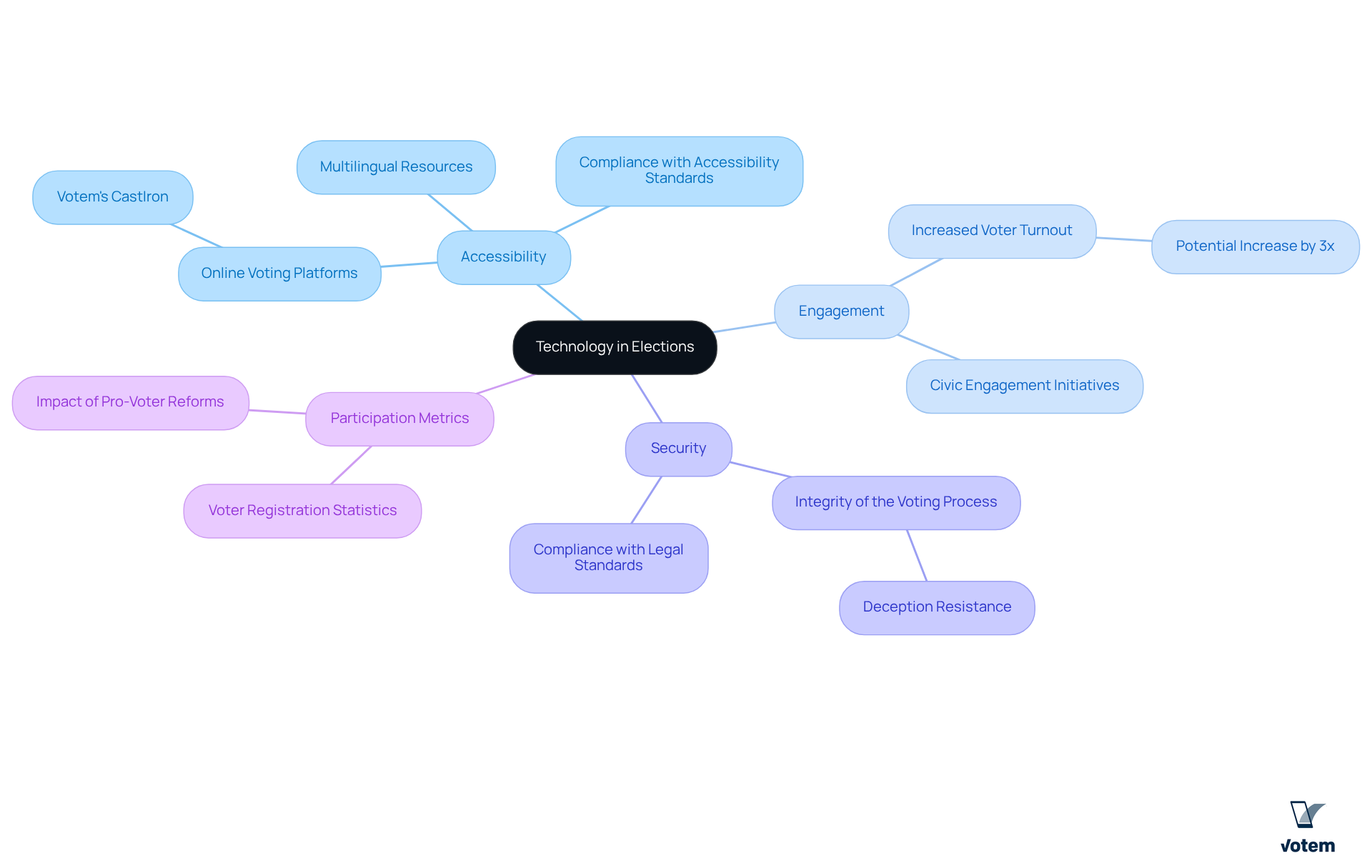
Fair Elections: Ensuring Equity and Justice in the Voting Process
Fair elections are fundamental to a thriving democracy, as they ensure that people vote for candidates to represent them in the decision-making process in a manner that guarantees every vote is counted and that all citizens can participate equally. However, systemic obstacles—such as identification laws and restricted access to polling locations—disproportionately impact marginalized communities, hindering their electoral engagement. This platform addresses these challenges through its , enhancing both accessibility and transparency in the electoral process. As highlighted by Linda McCulloch, the adoption of a modern system has enabled greater access for all eligible individuals, including military personnel and those with disabilities, representing a significant achievement in advancing equity.
Furthermore, the successful management of 299,000 ballots for the National Radio Hall of Fame, a notable increase from the previous year, illustrates the platform’s effectiveness in enhancing participation. By ensuring compliance with regulations and fostering a secure electoral environment, Votem promotes equity and justice, allowing all participants to engage meaningfully in democracy. Organizations dedicated to electoral integrity, such as the National Task Force on Election Crises, play a crucial role in dismantling these barriers, thereby enhancing public trust and encouraging higher voter turnout.
It is imperative to continue advocating for equitable voting practices that ensure people vote for candidates to represent them in the decision-making process in a fair and just system. The ongoing efforts to address these challenges are essential for fostering a more inclusive and participatory democratic process.
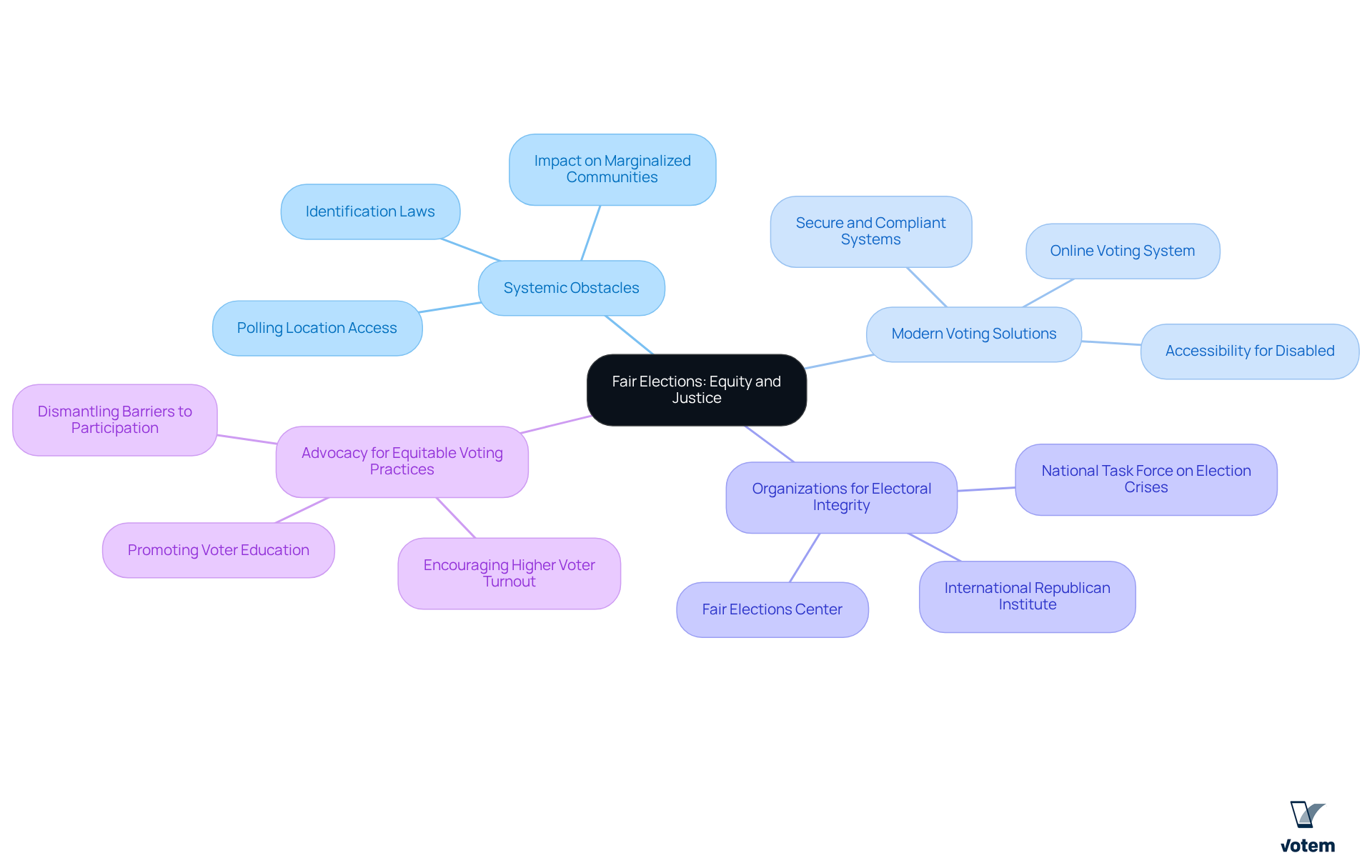
Conclusion
In a representative democracy, voting transcends mere participation; it embodies the essence of citizen engagement and accountability. This article highlights how various factors—secure online voting solutions, voter representation, and civic engagement—collectively shape the electoral landscape. By ensuring that diverse voices are heard and that the voting process is accessible and transparent, individuals can confidently select candidates who truly represent their interests in the decision-making process.
Key arguments presented underscore the importance of informed voting, the role of political parties in shaping electoral preferences, and the impact of social issues on voter turnout. The integration of technology in elections, particularly through platforms like Votem, emphasizes the necessity for secure and efficient voting methods that bolster public trust and enhance participation. Furthermore, the commitment to fair elections is paramount, as it ensures that every citizen has an equal opportunity to engage in the democratic process.
Ultimately, the significance of these elements cannot be overstated. As society moves forward, fostering an inclusive and equitable electoral environment is crucial for strengthening democracy. Encouraging active participation, promoting informed decision-making, and ensuring accountability among elected officials are vital steps toward a more representative and effective governance system. The call to action is clear: prioritize these principles to build a democracy that truly reflects the will of its people.
Frequently Asked Questions
What is Votem and what does it offer?
Votem is a secure online voting platform that provides tailored voting solutions for organizations such as credit unions, labor unions, and pension funds. It enhances public trust and involvement in representative democracy through clear and secure polls.
Why is secure online voting important for democracy?
Secure online voting is crucial for maintaining public trust in democratic processes, as it ensures reliable and secure voting, mitigating risks associated with traditional voting methods. It encourages participation and enhances the legitimacy of electoral outcomes.
What are the benefits of using Votem’s online voting solutions?
Votem’s solutions increase voter participation, particularly in labor unions, by streamlining the voting process. They also adhere to regulatory standards, ensuring reliability and security in the electoral process.
How does voter representation impact policy outcomes?
Voter representation ensures that diverse interests, particularly those of marginalized groups, are included in the decision-making process. This inclusivity leads to policies that better reflect the needs of the entire population, resulting in enhanced outcomes for all citizens.
How does Votem facilitate diverse voter participation?
Votem leverages secure online voting platforms to provide accessible methods for casting ballots, thereby encouraging participation from various demographics, including those who face barriers in traditional voting settings.
What role does accountability play in representative democracy?
Accountability is essential as it ensures elected officials fulfill their obligations to the electorate. Mechanisms such as regular elections and public oversight help maintain this accountability.
How does Votem enhance accountability in the electoral process?
Votem enhances accountability by enabling constituents to express their preferences and evaluate their representatives’ performance through secure online voting, thereby promoting a responsible political environment.
What is the significance of public trust in the voting process?
Public trust is vital for a functioning democracy as it encourages voter participation and reinforces the integrity of the electoral process, allowing voters to hold elected officials accountable for their actions.
List of Sources
- Votem: Secure Online Voting Solutions for Representative Democracy
- How Secure Are U.S. Electronic Voting Systems? | Econofact (https://econofact.org/how-secure-are-u-s-electronic-voting-systems)
- Cyberattacks Shake Voters’ Trust in Elections, Regardless of Party (https://gatech.edu/news/2025/06/27/cyberattacks-shake-voters-trust-elections-regardless-party)
- Confidence in voting access and integrity; expectations for whether and when the election results will be clear (https://pewresearch.org/politics/2024/10/24/confidence-in-voting-access-and-integrity-expectations-for-whether-and-when-the-election-results-will-be-clear)
- Ohio Lawmakers Propose Blockchain Voting in Elections Overhaul Bill (https://finance.yahoo.com/news/ohio-lawmakers-propose-blockchain-voting-165301081.html)
- Voter Representation: Ensuring Diverse Interests Are Addressed
- How underrepresented voters could influence the 2024 election (https://dornsife.usc.edu/news/stories/underrepresented-voters-shape-2024-election)
- Diversity and Political Representation: Overview | Research Starters | EBSCO Research (https://ebsco.com/research-starters/politics-and-government/diversity-and-political-representation-overview)
- Diversity and Democracy: Navigating the Complexities of the 2024 Election (https://fsi.stanford.edu/news/diversity-and-democracy-navigating-complexities-2024-election)
- AMI Elections Forum: New Research + Tools for Covering Diverse AAPI Voters – Newmark J-School (https://journalism.cuny.edu/events/ami-elections-forum-new-research-tools-for-covering-diverse-aapi-voters)
- How can we fix U.S. democracy? A USC-led initiative aims to find solutions (https://priceschool.usc.edu/news/democracy-trust-voter-turnout-polarization)
- Accountability: Holding Elected Officials Responsible for Their Actions
- Can social media be harnessed to bolster electoral accountability? (https://voxdev.org/topic/institutions-political-economy/can-social-media-be-harnessed-bolster-electoral-accountability)
- Press Coverage and Political Accountability | Journal of Political Economy: Vol 118, No 2 (https://journals.uchicago.edu/doi/10.1086/652903)
- Holding the Government and Representatives Accountable — (https://aceproject.org/main/english/es/esa05.htm)
- Civic Engagement: Encouraging Active Participation in the Democratic Process
- New Research Explores Connection Between Democracy and Local News (https://democracyfund.org/idea/new-research-explores-connection-between-democracy-and-local-news)
- Get Out the Vote: Cultivating Civic Engagement in Youth and Adults (https://aamchealthjustice.org/news/polling/get-out-vote)
- From Viral To Voting: Meeting Our Community Online During The 2024 Election (https://forbes.com/sites/civicnation/2025/02/12/from-viral-to-voting-meeting-our-community-online-during-the-2024-election)
- New Restrictions on Voter Registration Are Likely to Harm Young Voters (https://circle.tufts.edu/latest-research/new-restrictions-voter-registration-are-likely-harm-young-voters)
- Informed Voting: The Importance of Knowledge in Decision-Making
- The importance of accurate information in elections (https://poderlatinx.org/blog/the-importance-of-accurate-information-in-elections)
- CBU professor explains the importance of voting and being an informed voter (https://calbaptist.edu/about/news-events/news/cbu_professor_explains_the_importance_of_voting_and_being_an_informed_voter)
- Which information sources guided Americans’ voting decisions? (https://journalistsresource.org/home/information-sources-voting-decisions-2024-election)
- Voters’ knowledge of political news varies widely, study shows | MIT Sloan (https://mitsloan.mit.edu/ideas-made-to-matter/voters-knowledge-political-news-varies-widely-study-shows)
- How Media – Namely News, Ads and Social Posts – Can Shape an Election (https://rutgers.edu/news/how-media-namely-news-ads-and-social-posts-can-shape-election)
- Political Parties: Influencing Voter Choices and Ideologies
- Effect of Media on Voting Behavior and Political Opinions in the United States | IPA (https://poverty-action.org/study/effect-media-voting-behavior-and-political-opinions-united-states)
- Changing Partisan Coalitions in a Politically Divided Nation (https://pewresearch.org/politics/2024/04/09/changing-partisan-coalitions-in-a-politically-divided-nation)
- Why do we need political parties? (https://protectdemocracy.org/work/why-do-we-need-political-parties)
- What the 2020 Election Can Teach Us About Influencing Voters
| Institution for Social and Policy Studies (https://isps.yale.edu/news/blog/2022/08/what-the-2020-election-can-teach-us-about-influencing-voters) - Republicans and Democrats face a crisis of confidence (https://news.stanford.edu/stories/2024/02/political-parties-changed-time)
- Social Issues: Shaping Voter Preferences and Turnout
- Healthcare Is On The Ballot Due To 2025 Presidential Decisions (https://forbes.com/sites/lisafitzpatrick/2024/11/03/healthcare-is-on-the-ballot-due-to-2025-presidential-decisions)
- Issues and the 2024 election (https://pewresearch.org/politics/2024/09/09/issues-and-the-2024-election)
- The Role Health Care Issues Played in the 2024 Election: An Analysis of AP VoteCast | KFF (https://kff.org/womens-health-policy/the-role-health-care-issues-played-in-the-2024-election-an-analysis-of-ap-votecast)
- Healthcare Remains Important U.S. Voting Issue (https://news.gallup.com/poll/651755/healthcare-remains-important-voting-issue.aspx)
- Wolters Kluwer: Two-thirds of Americans say healthcare access and costs will impact their voting decisions (https://wolterskluwer.com/en/news/two-thirds-of-americans-say-healthcare-access-and-costs-will-impact-their-voting-decisions)
- Trust in the Electoral Process: Building Confidence Among Voters
- Cyberattacks Shake Voters’ Trust in Elections, Regardless of Party (https://gatech.edu/news/2025/06/27/cyberattacks-shake-voters-trust-elections-regardless-party)
- Few Americans Believe 2024 Elections Will Be ‘Honest and Open’ (https://pac.org/impact/few-americans-believe-2024-elections-will-be-honest-and-open)
- Communicating with Voters to Build Trust in the U.S. Election System | MIT Election Lab (https://electionlab.mit.edu/research/projects/mapping-election-science/white-papers/voter-trust)
- Public trust in U.S. elections is decreasing. But should it be? (https://universityofcalifornia.edu/news/public-trust-us-elections-decreasing-should-it-be)
- Technology in Elections: Enhancing Accessibility and Engagement
- Expanding Voter Access | League of Women Voters (https://lwv.org/voting-rights/expanding-voter-access)
- ICTs in Elections Database | International IDEA (https://idea.int/data-tools/data/icts-elections-database)
- Resources to Support Voter Engagement this Fall – Social Current (https://social-current.org/2025/09/resources-to-support-voter-engagement-this-fall)
- Does E-Voting matter for turnout, and to whom? (https://sciencedirect.com/science/article/pii/S0261379420301244)
- Enhance Digital Accessibility for Voters (https://skynettechnologies.com/blog/enhancing-digital-accessibility-for-voters-how-accessible-websites-can-impact-elections)
- Fair Elections: Ensuring Equity and Justice in the Voting Process
- Fair Elections Are in Grave Danger, Democrats Warn (https://democracydocket.com/news-alerts/fair-elections-are-in-grave-danger-democrats-warn)
- The National Task Force on Election Crises | (https://electiontaskforce.org)
- Media Archive (https://fairelectionscenter.org/media)
- Free and Fair Elections (https://iri.org/what-we-do/free-fair-elections)
- Preserving and Protecting the Integrity of American Elections (https://whitehouse.gov/presidential-actions/2025/03/preserving-and-protecting-the-integrity-of-american-elections)

